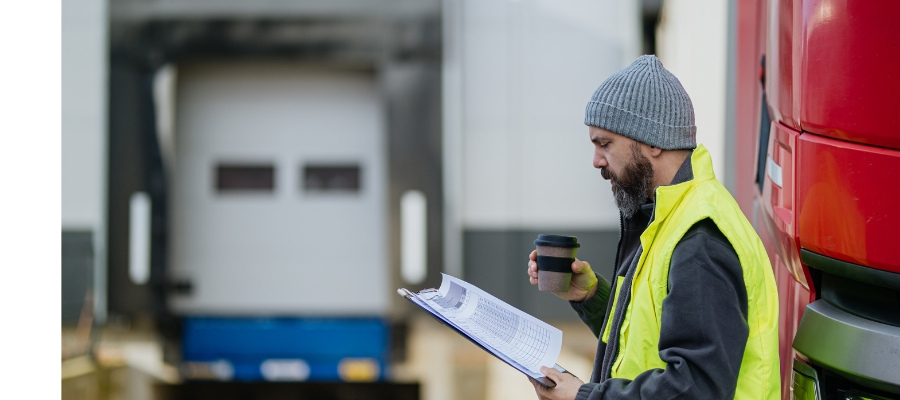🕒 Article read time: 2 minutes
Member Advice: How to avoid £10,000 Channel Crossing Checks fine

With summer approaching and calmer seas making crossings easier, migrant activity on the Channel may significantly increase. What could also increase is the likelihood that HGVs and vans will be targeted by illegal migrants seeking to enter the UK.
Remember, it is the driver’s responsibility to do everything they can to prevent this from happening.
Owners, drivers, hirers and operators must secure their vehicles to prevent unauthorised access by clandestine entrants. Otherwise, you could receive a fine under the UK’s clandestine entrant civil penalty scheme.
Drivers should only park at secure, accredited rest stops on the Continent and always complete a thorough walk-round check before restarting any journey. If a migrant incursion is suspected, please contact local police immediately.
If you are found carrying a clandestine entrant, even if you are a tourist, you could get a fine. You may face a fine of up to £10,000 for each clandestine entrant you carry. If you are driving a goods vehicle, and it is not adequately secured you could also get a fine, even if no clandestine entrant is found.
You may face a fine of up to £6,000 if you drive a goods vehicle that is not adequately secured. This applies whether you are entering or departing the UK. A vehicle’s owner, hirer or driver can be fined. For detached trailers, a vehicle’s owner, hirer or operator can be fined.
Companies may be liable for fines imposed on their drivers. As guidance, the government offers this check list:
Guidance on preventing clandestine entry:
Secure
Drivers must secure a vehicle when it’s first loaded. Secure soft sided vehicles with a tilt cord, passed tightly through all eyelets and winders. Secure the ends of the tilt cord with either a uniquely numbered seal or lock.
Record the seal number on the checklist. If the inside of the vehicle is checked during the journey, the driver must reapply the lock, tilt cord or other security device and/or apply a new seal. Secure hard sided and refrigerated vehicles with a seal, lock or other security device. Drivers should have spare seals to reseal the vehicle after each check. Vehicle owners must provide drivers with means of securing the vehicle appropriately, including tilt cord, seals or locks.
Check
Drivers must check a vehicle when it’s first loaded for any signs of unauthorised access. After each stop drivers must check the vehicle to ensure no unauthorised persons have entered the load.
Check any seals, locks, tilt cords or other security devices for signs of damage or tampering before and during the journey. Check the sides and roof of the vehicle and check all external compartments.
Record
Drivers must enter on a checklist all checks throughout the journey. Record the date, time and location of each check and record all seal numbers on the checklist. Drivers should keep spare checklists available. If many stops are required, use multiple checklists. Vehicle owners must provide drivers with means of record keeping such as checklists and written instructions before the start of every journey.
Managing any fines you receive
The government offers a scheme - The United Kingdom Border Force Civil Penalty Accreditation Scheme - to hauliers who consistently comply with and maintain high levels of vehicle security. Membership of the scheme can significantly reduce a penalty.
If you would like your company to be considered for this scheme, complete the application form on the GOV.UK website. Email the completed application form to: BF.CPAS@homeofficegov.uk
Published On: 11/04/2024 17:00:00

Comments Section
If you are a Logistics UK member login to add comments.
News In Brief
New green international shipping routes backed by government funding
The Department for Transport is launching a bidding process for the £1.5 million funding aimed at establishing zero-emission shipping routes to and from the UK.
This fund is intended to develop cleaner journeys for passengers and freight, create new jobs and boost the economy.
The fifth round of the Clean Maritime Demonstration Competition (CMDC5) will support feasibility studies focused on accelerating the development of ‘green corridors’ to map out necessary infrastructure, costs and regulatory measures essential for the decarbonisation of shipping routes.
If successful, there will be zero-emission shipping routes between the UK, Netherlands, Norway, Denmark and Ireland.
For more information click here
Latest articles
National Highways launches Too Close for Comfort campaign
It's time to back off and stop intimidating the person driving in front of you.
Read time: 2 minutes
View article
Policy win: Government launches new strategies around growth, infrastructure and trade
Last month, the UK government published the long-awaited Modern Industrial Strategy, Trade Strategy, and Infrastructure Strategy – each setting out intentions, ambitions and next steps for respective policy areas, central to the future of logistics.
Read time: 3 minutes
View article
Generation Logistics Case Study
Grace Brown, Logistics Degree Apprentice - ASDA.
Read time: 2 minutes
View article